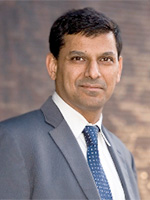Speaker's Profile

Raghuram Rajan
Governor, Reserve Bank of India (2013–2016); Chief Economist and Director of Research, International Monetary Fund (2003–2006); Eric J. Gleacher Distinguished Service Professor of Finance, University of Chicago Booth School of Business; Author
Throughout his three-year term as governor of the Reserve Bank of India, a central figure in the world’s third-largest economy, Dr. Raghuram Rajan both witnessed and helped shape the transformation of the global financial system. He now discusses the potential risks and rewards that face the major players in the global market—nations and corporations—and where the future of international economic policy is headed.
As the youngest chief economist and director of research to serve at the International Monetary Fund, Dr. Raghuram Rajan drew the attention of the world’s greatest bankers and financiers in 2005, when he delivered a prophetic warning to the Federal Reserve, in which he predicted the financial crisis that eventually struck in 2008. He was later the subject of prominent interviews in the Oscar-winning documentary on the crash, Inside Job (2010).
A distinguished economist with an intrinsic respect for the many risks that face the global market, Dr. Rajan explains how adopting sound and responsible policies will prevent the next great financial crisis. In his Financial Times “Business Book of the Year,” Fault Lines: How Hidden Fractures Still Threaten the World Economy (2010), Dr. Rajan offered a prescient diagnosis of the economic and political consequences of growing inequality in industrial countries. He knows that the future need not be dark—opportunities and rewards await those with the patience and discipline to work for a better world.
The Global Economic Outlook – the Opportunities and Challenges
Topics:
Even while overall growth seems tepid, tremendous financial opportunities still exist for both states and corporations. But with those opportunities, challenges are building. Dr. Raghuram Rajan knows this from firsthand experience—as governor of the Reserve Bank of India, he played a central role in the third-largest (and growing) economy in the world. In this discussion, he analyzes the economic impact of specific, targeted “global players”—large countries and common global forces—as opposed to a general overview of the world.
The Monetary Dilemma
Topics:
Easy money is having diminishing effect after years of accommodative policies. Dr. Raghuram Rajan weighs the significant risks incorporated by doing much more, with the difficulties of exiting from easy money. Not only will the first central bank that moves face significant costs, they could also be accused of failing their domestic mandate of maintaining inflation at reasonable levels. Dr. Rajan discusses possible ways policy could evolve, as well as the consequences to global asset prices, inflation and risk.
Democracy and Capitalism
Topics:
Democracy and capitalism tend to strengthen each other, across countries and over time, but not always. Dr. Raghuram Rajan describes the peculiar confluence of forces that are causing a wedge between democratic forces and markets today and why this is being expressed in the political movements we see. He argues that to preserve what is good in the global system of trade and finance, we need countries, especially large emerging markets, to step up and take leadership to move the dialogue forward. At the same time, industrial countries have to pay attention to domestic political demands to slow, or reverse, globalization and find ways to make angry citizens less anxious about the future. Dr. Rajan will discuss some policy options that could address these wide-ranging and impactful issues.
If you were interested in this speaker’s availability and fee, please contact at here.
<books>
<video>
■Dangerous Economic Fault Lines - NPR OnPoint
■Davos Annual Meeting 2010 - What Is the "New Normal" for Global Growth?













